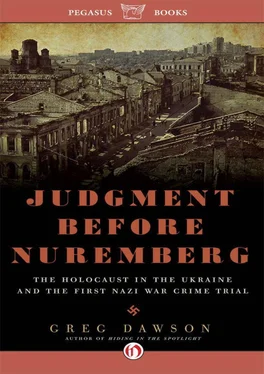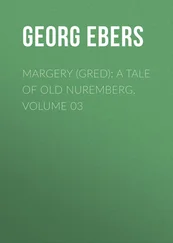Standing before the tribunal in his uniform “spangled with decorations,” Langheld clearly and with no trace of remorse recounted why it was necessary for him to invent evidence against innocent civilians. “My immediate superior, a major, reproached me because there were not enough executions under my command,” he testified. “I apologized and said that I had only been at the camp a short time and had not yet had an opportunity to show my diligence.”
“Did you not try to prove to the major that the prisoners of war had not committed any crimes?” the prosecutor asked.
“Yes, I knew there had been no crimes, and no cases,” Langheld said. “But I understood the major’s remark as an order to create cases—to invent them if they did not exist. I ordered one of the most exhausted prisoners to be brought to me, assuming it would be easier to obtain the necessary evidence. I asked whether he knew who was preparing to escape from the camp and at the same time promised to improve his food. The prisoner refused to mention any names, saying he knew nothing of such rumors. But as I had to carry out the major’s orders, I ordered the prisoner thrown to the ground and beat him with sticks until he lost consciousness. Then I drew up a statement, kicked the prisoner till he sat up, and tried to force him to sign it. He again refused.”
“Who signed the statement after all?” asked the prosecutor.
“The interpreter,” Langheld said.
The fabricated testimony with the forged signature stated that twenty prisoners were plotting to escape the camp. Langheld then chose the names of twenty prisoners at random from the camp list and presented them to the major who had criticized the low body count under his command. The prisoners were shot the following day. In another instance, Langheld demonstrated that he was not only diligent but resourceful in padding his body count.
Six women from nearby villages came to the camp seeking information about missing relatives. Langheld arrested the women and accused them of attempting to establish communication between prisoners and guerillas outside the camp. According to the official trial narrative, “They were undressed, flung on a bench and beaten with sticks and rods. But no tortures could force these Soviet women to give false evidence. They fell unconscious, but did not say a word.”
One of the women had brought with her a five-year-old child. The prosecutor asked how the child reacted to the beating.
“The child at first clung to its mother crying, and then crept away to a corner and crouched there in terror,” Langheld testified.
The next day, Langheld presented trumped-up charges against five of the women, and they were summarily shot. The sixth woman, the mother of the child, died that night from the beating. And what became of the child?
“He clung to his dead mother, crying aloud,” Langheld testified. “The lance-corporal who came to take away the woman’s body got tired of this, so he shot the child.”
Civilians as well as Red Army soldiers were herded into so-called prisoner of war camps in Ukraine, which in practice were holding cells for the walking dead, and arenas for sadistic sport. In one camp, Langheld testified, prisoners were forced to live in the open. Camp authorities allowed them to light fires at night for warmth—then stood by as soldiers opened fire on the huddled figures as if they were plastic ducks at a carnival midway firing range. The fun did not end there for the captors.
Prosecution:Tell us why, when German officers and soldiers came to the camp, as you testified at the preliminary examination, they tore off the caps of war prisoners and threw them into a forbidden zone?
Langheld:The soldiers practiced this as a sport in order to show their contempt of the Russians.
Prosecution:And what happened afterwards?
Langheld:When the prisoners tried to pick up their caps, the guard fired at them. Naturally there were occasions when they were killed.
Prosecution:Were there other occasions when prisoners were fired at?
Langheld:Yes. I myself witnessed similar incidents in the camp at Poltava.
Prosecution:So it means that war prisoners were chosen as shooting targets?
Langheld:Yes, it may be said that at the given moment they were regarded as game to be shot at.
Prosecution:Did German officers and soldiers take the prisoners’ clothes from them?
Langheld:Yes. All the good things they had were taken from them.
Prosecution:That is to say, they were robbed.
Langheld:Yes, that is so.
Prosecution:And did you take part in this robbery?
Langheld:Yes, I did.
The prosecutor asked Langheld how many Soviet citizens he had personally exterminated. Langheld hesitated, rolling his eyes upward in calculation. “I cannot give the exact figure,” he said, “but I imagine there were at least one hundred.” The prosecutor wanted to know if soldiers or officers were ever punished for brutalizing or killing civilians.
Stevens wrote that Langheld “pondered a moment… and then answered in the same quiet, measured voice in which his entire testimony had been delivered, that on the contrary such treatment was deliberately encouraged and rewarded. At the conclusion of his testimony, Langheld turned on his heels and strode back to the prisoners’ box.”
Next up was Hans Ritz, at 24 the youngest of the defendants, and also the most talkative and eager to heap blame on higher-ups. Born in 1919 in Marienwerder in eastern Germany, Ritz was the son of a professor and attended Königsberg University, where he studied law and music. He was a member of the Hitler Youth from age fourteen and served as President of the Court of Honor of Hitler Youth in Poznan while working there as a lawyer. In 1943, Ritz was drafted for service on the Eastern Front, and rose to the rank of Untersturmbannfuhrer (lieutenant) in the SS.
Ritz was “a small man with a caved-in chest, a gnomelike bald head and an infantile expression,” said a Time magazine story. Ritz’s appearance belied a curious mind and excellent memory for detail. He had been intrigued by stories of mobile gas chambers, Ritz testified, but not until he was posted to Kharkov in May 1943 was his curiosity satisfied.
“Lt. Jacobi told me they had much work to do in connection with arrested persons detained in the Kharkov prison but that, thank God, they had a special method of clearing the prisons,” Ritz told the court. “When I asked him what this method was, Lt. Jacobi told me it was the ‘gas van.’ I remembered that I had heard about this vehicle in Germany. I asked Lt. Jacobi to let me have a look at the vehicle. He said there would be a good opportunity to do so at six o’clock the next morning, as the machine would be loaded and if I came to the prison yard I would see it.”
At dawn the next day, Ritz watched as some sixty prisoners were packed into the truck. He noted “they were emaciated, their hair was matted, and there were traces of blood on their faces.” Some balked at the sight of the truck and were driven inside by kicks and blows from the butt ends of SS rifles. The inquisitive Ritz wondered how the resisters knew what awaited them. “Lt. Jacobi replied that… the gas van had been so extensively used in Kharkov, many people appeared to have learned what the van portended,” Ritz testified.
Having witnessed the loading of the gas wagon, Ritz naturally was curious to observe what happened when it reached its destination. Learning that three thousand civilians were to be shot for having welcomed Soviet authorities when Red Army troops briefly recaptured Kharkov, Ritz asked to watch and Major Kranebitter, S.D. commander in Kharkov, was happy to oblige.
Читать дальше












